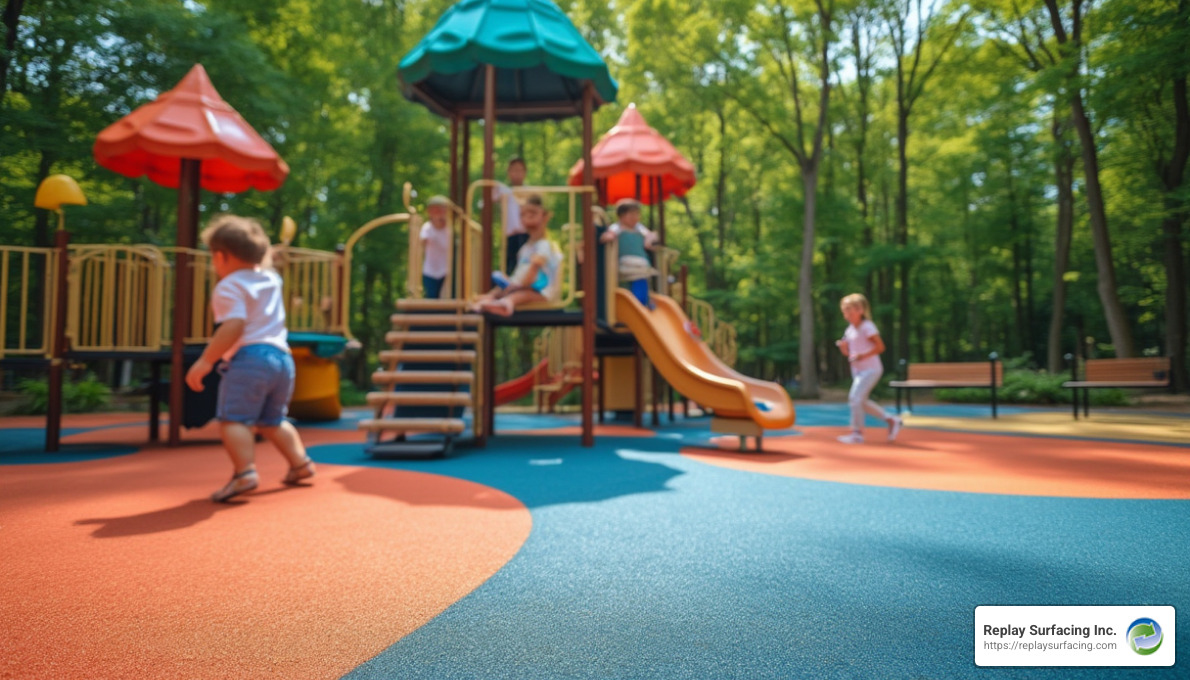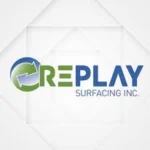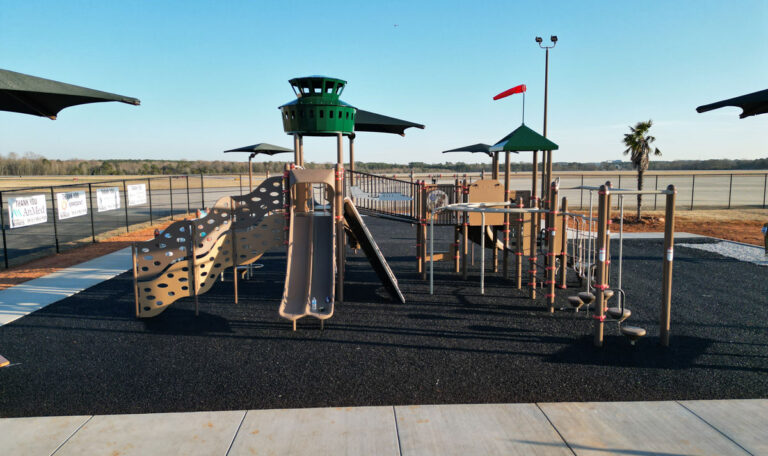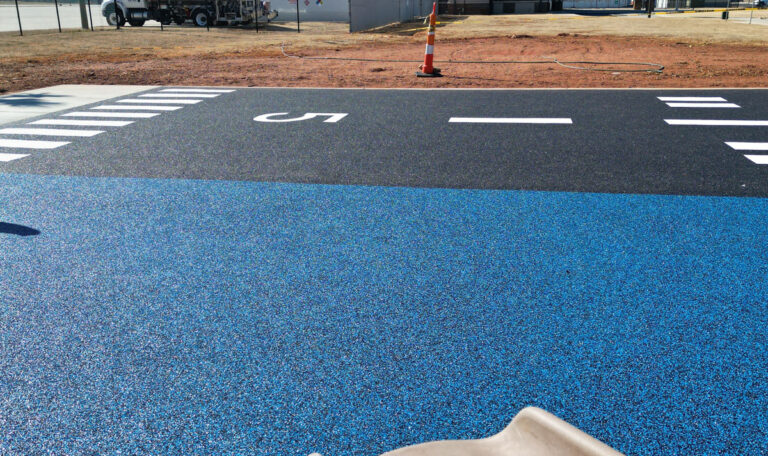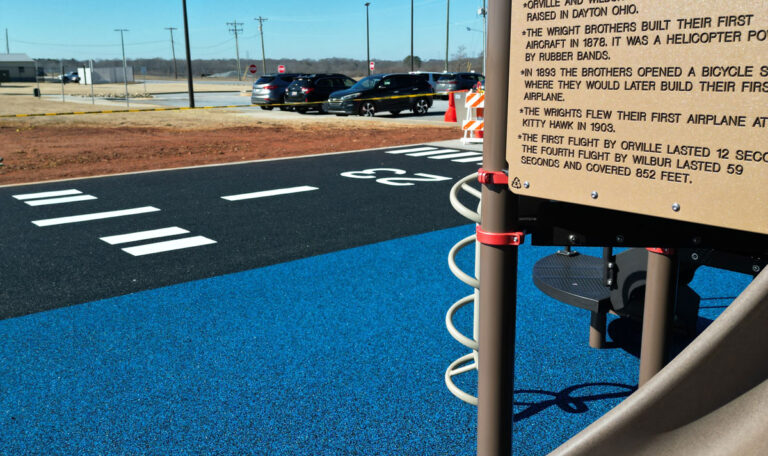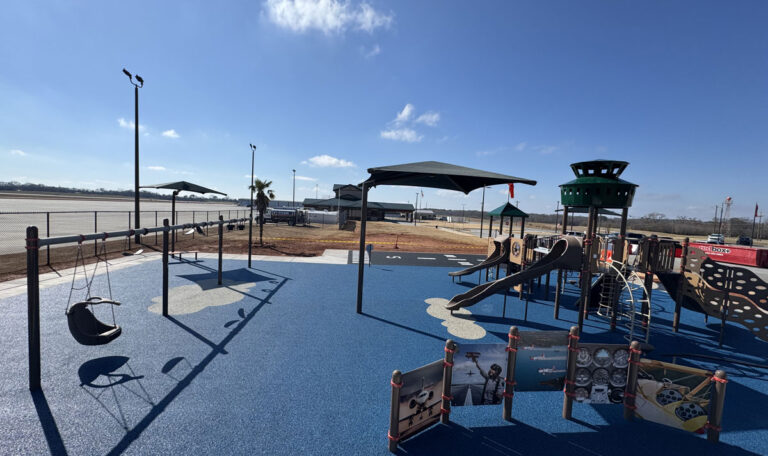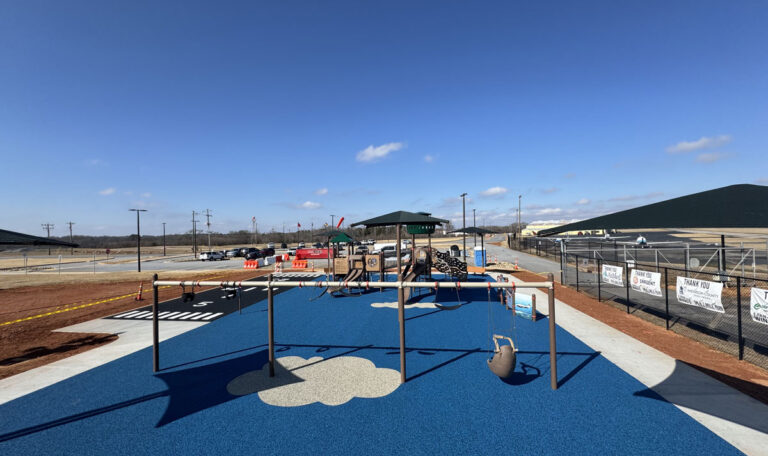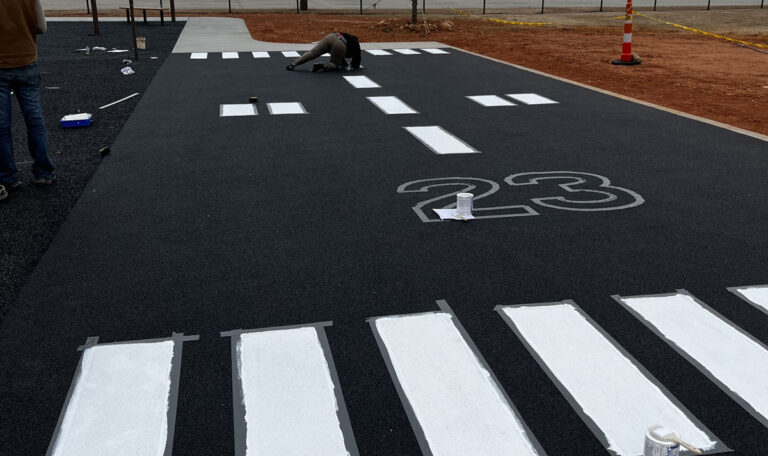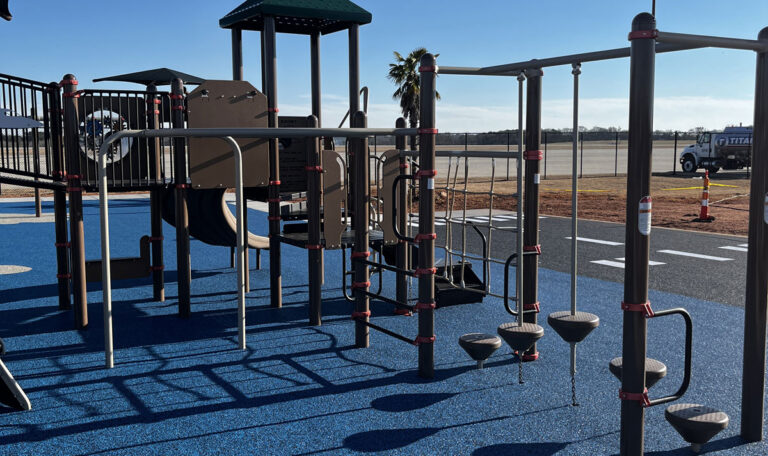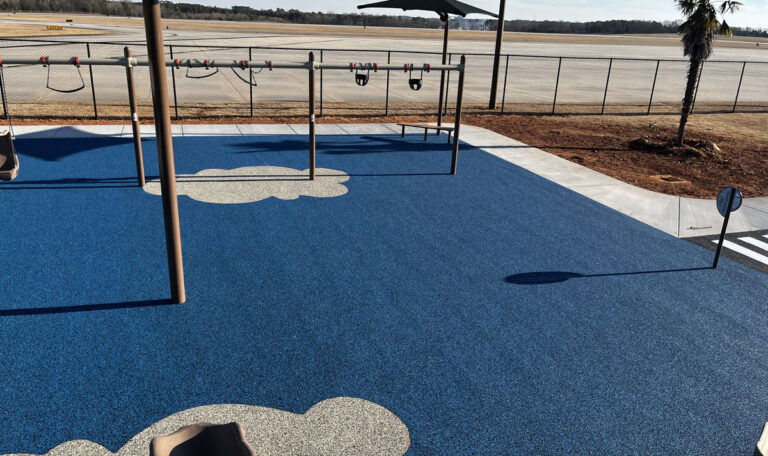For those seeking the ultimate rubber flooring for playgrounds, understanding its essential benefits can help in making an informed decision. Rubber flooring for playgrounds is popular due to several key factors:
- Safety: Provides excellent shock absorption to minimize injury risks.
- Durability: Withstands high traffic and harsh weather, lasting up to 15 years.
- Sustainability: Made from recycled materials and eco-friendly.
Choosing the right surface can transform a playground into a space that is not only fun but also safe and sustainable.
I’m Landon Olson, the proud operator of Replay Surfacing. With a background in mechanical engineering and sustainability, I have dedicated my career to creating innovative solutions like rubber flooring for playgrounds.

Quick rubber flooring for playgrounds definitions:
– poured in place rubber pool deck
– rubberized deck coating
– rubber pool deck surfacing
Understanding Rubber Flooring for Playgrounds
Rubber flooring for playgrounds is more than just a surface—it’s a safety net for children at play. This type of flooring is designed with three core principles in mind: safety, shock absorption, and sustainability.
Safety Flooring
Safety is the top priority for any playground surface. Rubber flooring excels in this area by providing a soft and cushioned surface that reduces the risk of injuries from falls. According to customer reviews, products like Jamboree Playground Tiles have been praised for their high quality and comfort, offering peace of mind for parents knowing their children are playing on a safe surface.
Shock Absorption
The secret to the effectiveness of rubber playground flooring is its exceptional shock absorption capabilities. This means that when kids jump, fall, or tumble, the rubber surface absorbs much of the impact, helping to prevent serious injuries. Products like Playsafer Tiles are specifically designed to offer excellent fall protection, making them a preferred choice for both residential and commercial playgrounds.
Recycled Rubber
An added benefit of rubber flooring is its eco-friendliness. Many rubber playground surfaces are made from recycled rubber, often sourced from old tires. This not only helps reduce waste but also offers a durable material that can withstand the elements. As noted in the research, rubber surfaces are UV, impact, and abrasion resistant, ensuring they last for years even in tough weather conditions.

By choosing rubber flooring for playgrounds, you are investing in a solution that prioritizes safety, durability, and environmental responsibility. This makes it an ideal choice for creating a play area where children can explore and have fun without unnecessary risks.
Types of Rubber Playground Flooring
When selecting rubber flooring for playgrounds, understand the different types available. Each type offers unique benefits, so let’s dive into the options: poured-in-place, rubber tiles, and rubber mats.
Poured-in-Place Rubber
Poured-in-place rubber is a popular choice for many playgrounds. This seamless surface is created by mixing and applying rubber on-site, allowing for customization in color and design. It’s ideal for incorporating school colors, logos, or fun patterns directly into the playground surface.
One of the key advantages of poured-in-place rubber is its durability. It’s virtually maintenance-free and designed to withstand heavy use and various weather conditions. It’s also ADA-compliant, ensuring accessibility for all children.
Rubber Tiles
Rubber tiles are another excellent option for playground surfaces. They come in various sizes and colors, offering a modular approach to playground design. These tiles are often interlocking, making installation straightforward and suitable for DIY enthusiasts.
Rubber tiles provide excellent shock absorption and fall protection, which is critical for playground safety. They can be easily replaced if damaged, adding to their convenience and long-term cost-effectiveness.
Rubber Mats
Rubber mats are versatile and can be used in specific playground areas, such as under swings or at the end of slides. These mats offer targeted protection where it’s needed most, preventing wear and tear in high-traffic areas.
Rubber mats are easy to install and can be moved or replaced as needed. They offer a quick solution for enhancing safety on existing playground surfaces without extensive renovation.
Choosing the right type of rubber flooring for playgrounds depends on your specific needs, budget, and design preferences. Whether you opt for the seamless look of poured-in-place rubber, the flexibility of tiles, or the targeted protection of mats, each type provides a safe and durable foundation for children’s play.
Benefits of Rubber Playground Flooring
When it comes to creating a safe and fun play environment, rubber flooring for playgrounds offers several compelling benefits. Let’s explore the key advantages: fall protection, low maintenance, and weather resilience.
Fall Protection
Safety is the top priority in any playground. Rubber flooring excels in providing superior fall protection. Its shock-absorbing properties reduce the risk of injury from falls, making it a preferred choice for playgrounds.
For example, poured-in-place rubber and rubber tiles are designed to meet safety standards like ASTM F1292-18, which focuses on impact attenuation. This ensures that children can play freely while minimizing the risk of serious injuries.
Low Maintenance
One of the standout features of rubber playground surfaces is their low maintenance requirements. Unlike traditional materials like wood chips or sand, rubber surfaces do not need frequent replacement or extensive upkeep.
- Poured-in-place rubber is virtually maintenance-free. Its seamless design prevents dirt accumulation, and cleaning usually involves simple rinsing.
- Rubber tiles and mats are easy to clean with a blower or hose, as mentioned by a customer who appreciated how leaves and debris easily blow off.
This ease of maintenance not only saves time but also reduces long-term costs, making rubber flooring an economical choice for playgrounds.
Weather Resilience
Rubber playground surfaces are built to withstand various weather conditions. Whether it’s scorching heat, heavy rain, or freezing temperatures, rubber flooring remains intact and functional.
- Playground turf, for instance, is UV stable and resistant to both heat and frost, ensuring durability throughout the year.
- The porous nature of rubber tiles allows water to drain quickly, keeping the play area dry and safe even after a downpour.
This weather resilience ensures that playgrounds remain accessible and safe for children, regardless of the season.

In summary, choosing rubber flooring for playgrounds brings peace of mind with its fall protection, minimal maintenance needs, and ability to withstand harsh weather. These benefits make it an ideal choice for both public and private play areas, ensuring a safe and enjoyable environment for all children.
Installation and Maintenance Tips
Installing rubber flooring for playgrounds is a straightforward process, but it requires careful attention to detail. Here’s a simple guide to help you understand the process:
Installation Process
- Substrate Preparation: Before installing rubber flooring, ensure the ground is properly prepared. This means clearing away debris and leveling the surface. Proper drainage is crucial to prevent water accumulation, which can damage the flooring over time.
- Laying the Surface:
- For poured-in-place rubber, professionals mix rubber granules with an adhesive and pour the mixture over the prepared surface. They then spread and smooth it out using trowels. This creates a seamless and durable surface.
- Rubber tiles and mats are installed by placing them directly onto the prepared substrate. These options are often easier to install and can be a great DIY project for those looking to save on installation costs.
- Quality Check: After installation, a thorough inspection ensures the surface meets safety standards and is free from defects. This step is crucial to ensure the longevity and safety of the playground flooring.
Maintenance-Free Benefits
One of the biggest advantages of rubber playground surfaces is their minimal maintenance requirements:
- Routine Cleaning: Regular cleaning involves simply sweeping away debris or using a hose to wash the surface. This keeps the playground looking fresh and safe for use.
- Durability: Rubber flooring is designed to withstand heavy use and harsh weather conditions. Its resilience means you won’t need to worry about frequent repairs or replacements.
- Eco-Friendly: Many rubber surfaces are made from recycled materials, contributing to environmental sustainability while providing a safe play area.
By focusing on proper installation and taking advantage of the low-maintenance nature of rubber flooring, you can ensure a long-lasting, safe environment for children to play. This makes rubber flooring a smart choice for playgrounds of all sizes.
Frequently Asked Questions about Rubber Flooring for Playgrounds
What is the cost of rubber playground flooring?
The cost of rubber flooring for playgrounds varies widely. You can expect to pay anywhere from $2 to $12 per square foot, depending on several factors:
- Type of Rubber Flooring: Poured-in-place surfaces are generally more expensive due to the labor-intensive installation process. Rubber tiles and mats can be more budget-friendly and are often easier to install yourself.
- Thickness and Quality: Thicker and higher-quality materials provide better shock absorption but come at a higher cost. Always consider the safety needs of your playground when selecting materials.
- Design and Color Options: Custom designs or vibrant colors can also increase the price. However, using a 50/50 color/black mix can help save on costs while still achieving a great look.
How is rubber playground flooring installed?
Installation methods depend on the type of rubber flooring you choose:
- Poured-In-Place Rubber: This method involves mixing rubber granules with an adhesive and pouring it over the prepared surface. Professionals then trowel it smooth. This seamless surface is durable and meets ADA safety standards.
- Rubber Tiles and Mats: These are laid directly onto the prepared substrate. They often use an interlocking system, making them a suitable DIY project. This method is quicker and less labor-intensive than poured-in-place options.
Substrate Options: The substrate must be clean, level, and well-drained. Concrete, asphalt, or compacted stone bases are common choices. Proper substrate preparation is key to ensuring the longevity and performance of the flooring.
Is rubber flooring safe for playgrounds?
Yes. Rubber playground flooring is shock-absorbing and designed to reduce injuries from falls.
How long does rubber playground flooring last?
Most rubber playground surfaces last 10–15 years with basic cleaning and inspections.
Are there any safety concerns with rubber playground surfaces?
While rubber surfaces are designed for safety, there are some concerns to be aware of:
- Lead Levels: A study in Boston found that rubber surfaces sometimes have higher lead levels compared to other materials like sand or mulch. It’s crucial to check that any rubber flooring you choose meets safety standards for lead content.
- Safety Standards: Ensure the rubber flooring complies with relevant safety standards, such as those set by the Environmental Protection Agency (EPA). Proper installation and regular maintenance can help mitigate potential risks.
By understanding these factors, you can make informed decisions about choosing and maintaining rubber playground flooring, ensuring a safe and fun play area for children.
Conclusion
At Replay Surfacing Inc., we believe in creating playgrounds that are as safe as they are fun. Our rubber flooring for playgrounds is not just about safety and durability—it’s about sustainability and customization too.
Sustainable Surfaces
We are proud to recycle tires into high-quality rubber surfacing products. This process not only reduces environmental hazards but also supports eco-friendly practices. By choosing our products, you contribute to a greener planet, helping transform waste into something valuable and long-lasting.
Customizable Options
Every playground is unique, and we ensure our surfaces reflect that. Our rubber flooring can be customized in a variety of colors, patterns, and designs to match the theme of any playground. Whether it’s incorporating school colors or creating fun patterns, our solutions are as flexible as they are functional.
When you choose Replay Surfacing Inc., you’re not just opting for a product; you’re investing in a promise of quality and sustainability. Our surfaces are designed to last, providing a safe, engaging space for children to explore and play.
Rubber flooring for playgrounds offers long-term safety, durability, and low maintenance for schools, parks, and childcare centers. It helps reduce fall injuries while standing up to daily use and changing weather. At Replay Surfacing Inc., we design and install rubber playground flooring that meets safety standards and supports sustainable outdoor play spaces.
Ready to transform your playground into a safer, more sustainable space? Contact us today to discuss your project. Let’s build a playground that reflects the spirit of your community and stands the test of time.

